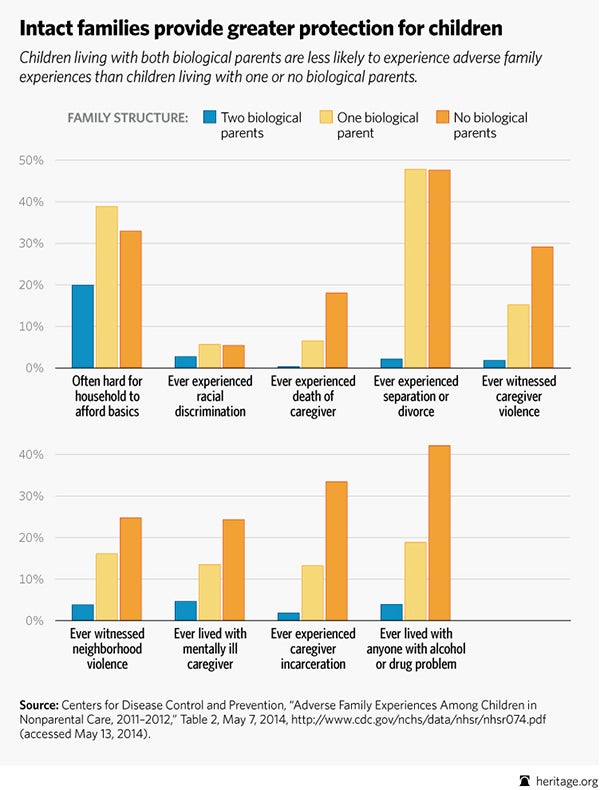New Report: Intact Families Keep Children Safe
Christine Kim /
New data confirm that the intact family protects children.
According to a new report from the Centers for Disease Control and Prevention (CDC), children living with both biological parents are the least likely to experience a host of adverse family experiences compared to peers living with just one biological parent or neither biological parent.
The report focuses on nine negative experiences:
- Household financial hardship,
- Racial discrimination,
- Death of a caregiver,
- Caregiver incarceration,
- Parental separation or divorce,
- Witness of caregiver violence,
- Witness of neighborhood violence,
- Residence with a mentally ill caregiver, and
- Residence with anyone with an alcohol or drug problem.
For all of these adverse experiences, children living with only one biological parent tend to fare worse—much worse—than those living with both biological parents. And for seven of the nine experiences, children living with neither biological parent fared, on average, worse than those living with only one biological parent.
The differences are striking. Compared to children living with both biological parents, those living with just one are twice as likely to experience household hardship and racial discrimination, three times more likely to have ever lived with a mentally ill caregiver, four times more likely to have witnessed neighborhood violence, and five times more likely to have ever lived with anyone with an alcohol or drug problem. They are more than seven times more likely to have ever experienced caregiver incarceration and witnessed caregiver violence, more than 16 times more likely to have ever experienced the death of caregiver, and 21 times more likely to have experienced a separation or divorce. The disparities are even greater between children in intact families and those who do not live with either biological parent.
As the report points out, social science research suggests that the cumulative effects of adverse experiences could be long-lasting, such as negative health outcomes. Sadly, only about one in five children with a single biological parent or neither parent has been spared these negative experiences, compared to 70 percent among those in intact families. By contrast, while less than 1 percent of children in intact families have experienced four or more of the adverse experiences, 14 percent of their peers living with just one parent have. The figure is 30 percent for those living with neither parent.
Decades of research shows that children tend do best in intact families. However, the share of children living with two married biological parents has been declining steadily. This has serious implications not only for individual well-being but for the well-being of society. It is more important than ever to strengthen marriage to ensure that as many children as possible have the opportunity to be raised in intact families and the greatest opportunity to thrive.

